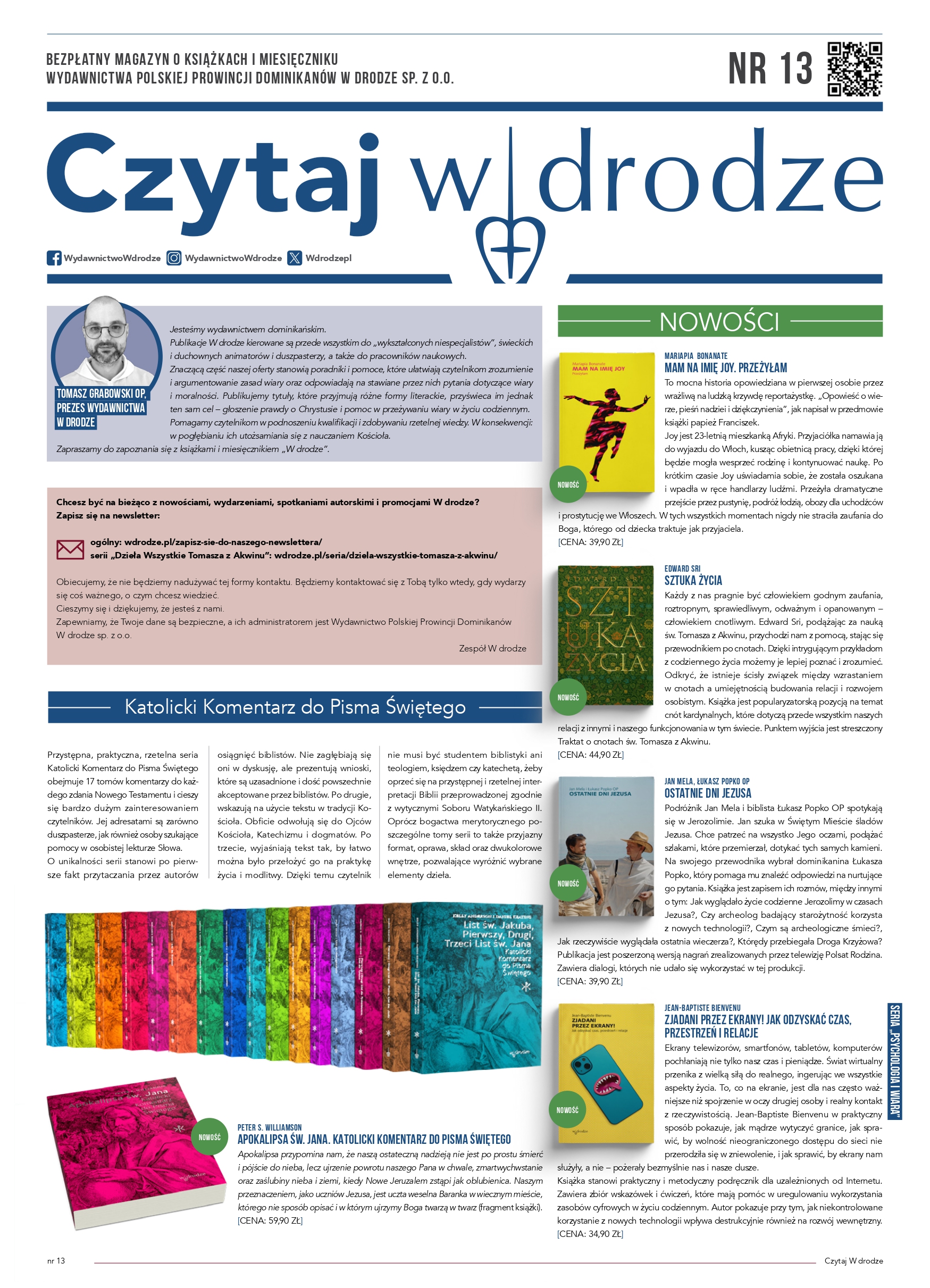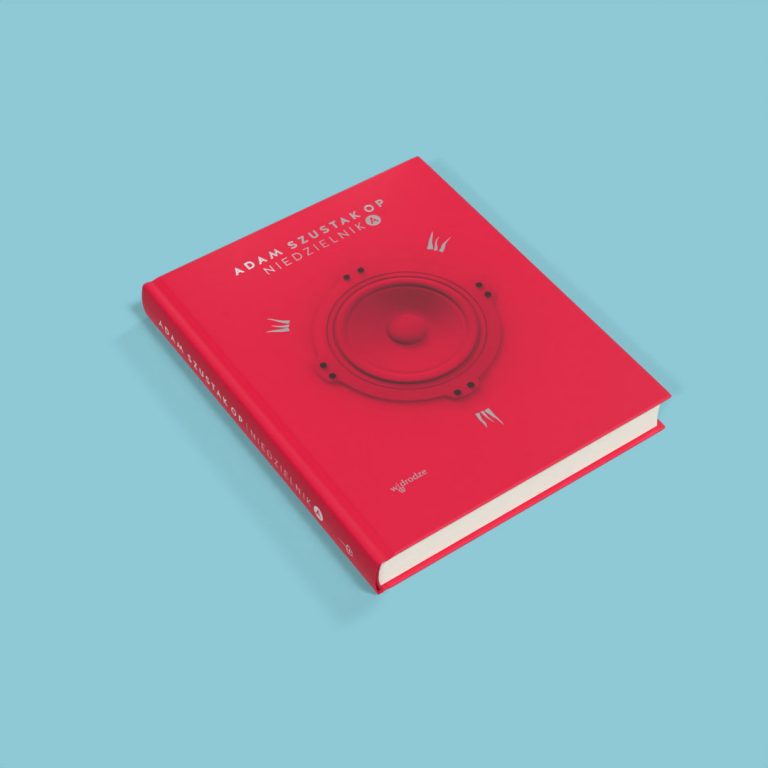List do Galatów
Anger is not an opposite of intimacy. Even our loved ones can sometimes frustrate us, for they cannot fulfill all our needs.
Mateusz Łuksza OP: What is anger?
Andrzej Wiśniewski: Anger is a very important feeling. Thanks to anger we can set boundaries, take care of ourselves, demand to be treated better, claim our rights, tell our loved ones that we do not like what they do and care for them in that way. We can tell them that we get angry at some things they do, so they could change their behaviour. In our culture anger is regarded as a bad feeling that makes our life more difficult. In my opinion, it is not quite true. It his hard to imagine life without anger and without expressing anger, even though telling other people that we are angry may cause conflicts or attack on our self-esteem.
Why do we get angry?
We can feel angry from our very early years. Let us just look at small children showing their anger and protest. They build their indenity and get some control over their lives in this way. This is particularly true in the teenage years, when young people separate from their parents to take care of their own lives. Sometimes they do it by showing off or by doing something silly to annoy their parents.
Inability to express one’s anger is very often an underlying cause of many problems in building relationship with a partner and with the world. Adult men who, as teenagers, did not confront with their peers can have problems in relationships where assertiveness is crucial. Inability to express anger may result in depression. It can also lead to serious marital problems.
What kind of problems?
They vary from sexual problems topsychosomatic illnesses. Also, anger expressed in an unhealthy way can result in an unrealistic image of the person we are related to. So when we have an argument, we tend to tell each other things that normally would be never said. Marital quarrels can open such levels of communication, that are not available for us in everyday life. If well managed, they can be a chance for better understanding – they can inform us what bothers our partner. They can protect us against long-lasting, destructive silent non-communication, which is the ideal way to build unrealistic, anxiety-based fantasies about our partner.
So you want to tell us, that where is intimacy, there is always anger?
Yes, of course, because anger is not the opposite of intimacy. Even our loved ones can frustrate us from time to time. They cannot fulfill all our needs. There is a paradox, which often happens during therapy sessions, when quarrel is the only way to reach some kind of intimacy. But it is really devastating if anger is the only way of expressing closeness between people.
If I care for someone, I tell them about my negative feelings, but at the same time I want to hear from them what they do not like in my behaviour. This is the way how my partner protects me agaist destructive fantasies about their behaviour and the way of protecting myself against my partner’s fantasies about me.
So we can express our anger in a bad and in a good way?
Of course. There is a very destructive kind of anger where criticism and blaming other people dominates. Such anger is not a sign that you care for someone. It serves one purpose: to get power over somebody and prove that I am the more important one, so I have the right of imposing my wants and demands on the other person. Sometimes parents do this to their children. Constant criticism is their way of showing love and care for the children.
But when I say to somebody: ‘I do not want to hurt you, but I do not like this or that in your behaviour, I show that I care about this person’.
Some people often say that their life is a failure, they cannot change themselves, their job is rubbish, they do not have enough strength, etc. When I hear something like that, I feel they have an anger problem, but they do not realise they are actually angry.
Many people have been raised with a mindset that it is wrong to feel angry and it is wrong to express anger. We try to live up to this way of thinking. If bottled up, anger can be destructive. It leads to bitterness, to the lack of energy for fighting difficulties. It also results in helplessness, that manifests itself in inability to do anything, because it is beyond one’s power. A denied anger very often leads to depression, when our sense of agency shrinks or nearly disappears. Thanks to anger we can conquer the world, for instance in our sex life.
So let’s stick to sex, because I think sexual problems are connected with anger problems. If we fail to express our anger properly, what consequences does it have for our sex life?
I do not mean we should be angry at our partner’s sexual behaviour. However, it is important to set boundaries to avoid any abuse and to build sexual relationship in a way that is good and safe for us. There is no sex without desire and to desire someone means to cross someone’s boundaries. There is a very good definition of a well-managed desire: ‘Know how far is too far’. Therefore, it is definitely possible to desire things that for my partner can be hard to accept. The same situation can happen when I try to attract a potential partner’s attention or when I fight with the other love rivals.
Anger helps us to take risks to change our behaviour. Expressing our anger gives us a feel of independence. Life is very tough for those, who are unable to say, that something makes them angry or that they do not like something. The same happens in relationships. If I can tell my partner that I do not like something, I feel I am somebody significant for them, I have the power to make decisions and influence my partner. Often partners are afraid of being angry at each other. They build their relationship in a way that does not allow their anger to be expressed. It usually happens to women. They do not show their anger. They would rather try to deserve their partner’s approval. Also, they try to change anger for feel of hurt, which is much more socially acceptable, therefore easier to express. It may lead to disaster, because men do not value such kind of women. On the other hand, men who fear confrontation can become overprotective. In order to get much valued acceptance, they try to fulfill all partner’s needs, they do not set any boundaries and they do not care for their independence. They do not say: ‘I want to be with you, but we are different’. They do not realise the wonderful rule which says: The level of love dictates the level of freedom.
You say that anger gives us a lot of energy, but in our culture it often implies feel of guilt. For instance, whe we shout or say harsh words angrily, we feel guilty straight away.
This problem has a lot of reasons, one of them is Christian tradition, according to which expressing anger is a sin. For instance, the Gospel story about Jesus expelling traders from the Temple, has, in my opinion, been left unsaid in the Catholic Church. But it is a classic example of how the great Man uses his anger. He uses his anger to send a message: ‘It mustn’t be like this’. I have an impression that for ages in Christianity, Jesus has been shown as an ideal man, carer and counsellor, who loves and sacrifices himself, who is gentle and calm. Very rarely or never we see in him a man who was able to feel anger. But when Jesus defends a harlot, he says: ‘Let him who is without sin among you be the first to throw a stone at her.’ So he confronts woman’s prosecutors, he makes a good use of his anger and dissatisfaction. The members of the Catholic Church do not talk much about that. Expressing anger goes hand in hand with the feel of guilt in the Church, therefore anger has become sinful.
But still, we can show our anger in a way that allows other poeple get information which is important for them. They do not have to feel hurt and stigmatized by our anger.
Matching anger and guilt together is also a part of a certain parenting style. According to it, only adults can make all judgments. Their children are told that they cannot express thier opinions and judgments until they grow up. What are the consequences? Parents lose the only place where they and their child can be partners. This place is in the area of feelings. When a child is angry, most parents are outraged and they say: ‘How could you talk to me like that, you little sod!’. A parent cannot be a partner for a child in any other field. A parent knows better what is important, what is valuable, etc. Only my anger and my child’s anger are ‘a partner experience for both of us’. We do not need any practice here, we just feel angry. Instead of meeting our child on the emotional level, we want to be in charge again and so we make impossible for our child to express their various feelings and needs.
I believe there are many kinds of anger and many reasons to be angry.
Of course. We feel angry when something does not go as it should go or when things that make us feel we live a good life are denied or broken. The example of Christ expelling traders from the Temple fits well here.
There is also anger rooted in our frustrations. For instance, when my neighbour has better life than me, I am trying to put the skids under him. This kind of anger is related to jealousy and it is destructive, not nurturing. It robs me of my strength.
Another kind of anger comes from the fact that I have been badly treated and my boundaries have been violated. This kind of anger can be creative. I can turn it into energy and use this energy to change my situation. I can express my anger in two ways. I can do it directly when I talk about my anger or through so called passive aggression. For example, a wife tells her husband to wash the dishes. The husband feels angry at that, but he does not say a word. He starts dishwashing and suddenly he lets go of a plate and it smashes. So the wife takes over dishwashing. It is very difficult to react to such kind of anger, because it has been hidden behind awkwardness and helplessness.
Let us talk again about how to acknowledge our anger. It is perhaps easier with other feelings. When I am happy, I feel strong. Sadness overhelms me. But how can I recognise that I am angry?
It often shows through the body, when we have recurrent headaches or palpitations. It is called psychosomatics and it happens when hidden emotional conflicts manifest themselves through bodily symptoms. Some people, when facing conflict, suddenly lose their energy or even fall asleep to numb any feelings. It means they experience a strong feeling, but they do not let themselves acknowledge it. After all, it is not normal to fall asleep when somebody is being attacked. Sometimes anger is hidden behind irritability or uncertainty. Very often, it is hidden behind feel of hurt, for to feel hurt is more accptable than to feel angry.
Sometimes our anger is overexpressed. For example, somebody tells me off for something insignificant, but I react aggressively. Then both of us feel we are out of proportion with our anger.
– I think this is a situation where somebody has difficulties with expressing anger, so anger gets bottled up and suddenly bursts out. Then the smallest thing can cause a waterfall of criticism. Another possibility is that we deal with a narcissistic personality, as it is called in psychological diagnostics. Such people often can overreact with anger even at gentle behaviour if it violates their self-image. Anger protects them against the dangerous dissonance between their real and ideal self-image. It serves as a barrier for information, which can disturb the balance between those self-images. It is also a message: ‘Be careful, if you try to criticize me, I may ruin you.’ Now, you can see clearly how fragile a narcissist’s self-image is.
How can we defend ourselves from such attack?
People with strong self-esteem realise that such attack of anger has nothing to do with their behaviour. They feel this is their attacker’s problem, so they can still rely on themselves. They can tell the attacker: ‘You have gone too far, I do not like the way you react when I am trying to tell you something in a kind way.’ But people with low self-esteem can become dominated or even devastated by such anger. They immediately start to look for the reasons of that anger in themselves, although they had not done anything wrong. They think: ‘I must have done something if he was so madly furious’. Victims of violence often feel like that. If somebody yells at me, I crouch and I instantly assume that I had done something wrong.
We have said that expressing our anger can result in positive energy in our life. But how can we learn to express our anger properly? Which stage of life is the most important here?
Each of them, but childhood in particular.
I doubt there are many parents who teach their children how to cope with anger…
No, parents mostly do not teach that. Many of them did not see a lot of situations where anger was expressed in a good way, that is why they are not good teachers. Most of them feel threatened when their children tell them about their anger, because they think they will loose their parental authority if they let children do that. I do not think I had ever met the parents who said: ‘I am glad that you, my son, said that you are angry at me.’ or ‘It is good you tell me about your dislikes and dissatisfactions.’
But it is crucial for children to learn how to talk about their anger, dissatisfaction and resentment. It protects them from accumulationg unspoken anger, that can turn into an opinion that ‘I am a bad child if, in spite of my parents telling me not to, I let myself be angry, so I am hurting my loving parents.’
How to cope with anger?
First of all it is necessary to understand and accept that when I am angry, it does not mean I am a bad man. Anger is just like anyother feeling. It is important though what I do with it, how I express it. It has been tested, especially in psychotherapy that if a someone shy and cowed takes a risk to show their anger, people start to like and appreciate them.
We are often angry at our parents. We know that we should respect, love and care for them, but on the other hand we do not always manage to do that. Then we get angry and we immediately feel guilty.
It can happen to someone who has separation problems. For example they have an obligation to visit their parents showing them their love by doing that. Those parents are afraid of being abandoned and not important any more for the children, so they try to appeal to various kind of rules or norms and force their children to behave in the way they consider appropriate. They can say: ‘ You should care for us, we did so much for you. You should come to see us.’ They try to make them feel guilty, which is very close to anger. If we often make the other person feel that way, we should not be surprised, that they often get angry at us. Children, also the adult ones, express such anger by avoiding their parents and finding excuses for not visiting them: work overload, tough times. This kind of behaviour reinforces parents’ fears again.
But a guilty feeling does not have to be a negative thing. Could you explain a difference between a good feel of guilt and the one that is harmful and would need to be ‘acted out’ in some way?
There is a bright side of guilt. We often hurt others whether we want it or not. If I feel guilty when I hurt someone, then my feel of guilt can be very positive. I can apologize, I can admit my mistake and try to correct it. I can experience that I am not perfect and that is OK. But when I am constantly feeling guilty, because I think everything I do is wrong and hurtful, I can get angry very quickly. Guilt is a result of various norms that I apply to myself, including ideal and unrealistic ones. So I am feeling guilty and unhappy all the time, I do not match up to other people’s expectations and I am still feeling that I hurt somebody. That must make me frustrated. Therefore, I am in a vicious cycle, for when I feel angry, I believe that I hurt people even more, so I would better bottle this anger up. But accumulated anger causes fear, so I am strarting to fear more and more, that I will hurt the others with my negative feelings. Eventually, the accumulated anger bursts out with aggression. The visious cycle is then complete, because my aggression confirms my negative self-image.
How to break the vicious cycle?
We get trapped into the vicious cycle when we want to get too much control over our anger, because we are afraid of other people’s reactions. To break it we need to give ourselves the right to express our anger and accept that nobody is perfect.
Tłumaczenie: Jolanta Brózda-Wiśniewska, Daniel Wiśniewski


























.jpg)

















Oceń